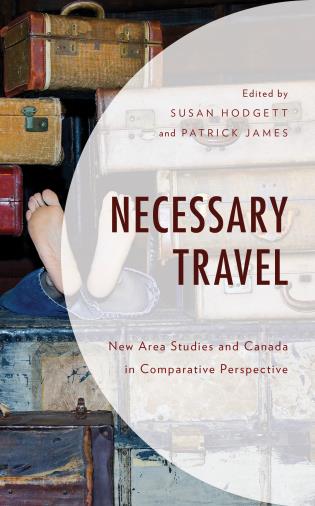
Susan Hodgett is the founding Professor of Area Studies at the University of East Anglia. She very kindly found some time in her diary to talk to us about her new book – Necessary Travel: New Area Studies and Canada in Comparative Perspective– co-edited with Patrick James (University of Southern California) which has just been published by Lexington Books.
Q Professor Hodgett, thank you for your time, and many congratulations on the publication of your new book! Please could you begin by saying a few words about the motivation behind your book – and the reason for publishing a new book on Area Studies now?
There was a real need for a new book about the future of Area Studies. For close to twenty-five years Social Scientists, and particularly Political Scientists, had criticised Area Studies for being overly descriptive and lacking analysis. Having read a lot of Area Studies research over the last ten years I disagreed with this view, believing that Area Studies as a field had an important contribution to make in the 21st century. Patrick James and I make the argument that we must rethink old models or modes of knowledge production and transmission in the new millennium. We advocate the development of a New Area Studies that includes the best of older models, what we call Traditional Area Studies, plus, novel research approaches in the new century. We promote innovative research methods using interdisciplinary approaches to know better what it feels like to live in and be of a particular place. We believe this is crucial, for as the world is globalising it is also experiencing unpleasant and unexpected shocks- which are often unforeseen (the 2008 economic crash, Brexit, the election of businessperson Donald Trump to the White House). This, combined with growing urgent and complex problems around the globe (climate change, the rise of challenges to democracy, disruptions etc.), means that in the 21st century we must use all methods at our disposal from the Arts and Humanities, the Social Sciences and Science to help us fully understand wicked problems in our societies. Area Studies can help with these challenges. We encourage a conversation about how this may be done.
Q How did you first become interested in the field of Area Studies?
I grew up in Northern Ireland (NI) during the period of “the Troubles” during serious, prolonged violence. I was interested in how this conflict was understood inside NI and outside. I pondered how to help people appreciate that things could improve, that there was hope for the future, and that individual lives could improve going forward. My research indicated that those outside NI believed that public policy experimentation could take place there- as the economic and political situation was so serious. Experimentation did take place, and funds from the European Union underpinned the peace process in innovative ways. This led me to explore the uses of storytelling and narratives in public policy as an effective means to understand how people felt about the quality of their lives. Then I started to do comparative policy research between NI and Atlantic Canada. Both regions experienced pockets of high unemployment and poverty often combined with low levels of education. The experience of living in NI encouraged me to think about liminal parts of the world -particularly what it was like to live in places, which were excluded economically, politically or socially. I was investigating parts of the developed world on the edge, economically left behind -where few people wanted to be. I began to think about how to investigate such problems and started to read about other parts of the world in similar situations. My interest in Area Studies then was very practical -focusing on what I could learn from other places.
Q Your book sets out a new – and really exciting – agenda for Area-based research. For readers who might be unfamiliar with the field, could you say a few words about what Area Studies is, and how your ‘New Area Studies’ approach differs from others?
Area Studies is multidisciplinary research focusing on specific geographic regions or culturally defined areas; and in regards to teaching, Area Studies it is often delivered using interdisciplinary approaches. Up to the millennium, there was criticism from Social Scientists on the quality of Area Studies research. Many Area Studies scholars took this to heart and over a period of 25 years reflected on how they could rethink their work and collaborate with others. Recently there has been a resurgence in Area Studies research -and a growing confidence from scholars that they have something important to say. There are more and more instances of comparative politics and International Relations scholars reaching out to area specialists and each discipline benefits from overcoming disciplinary divides. My work with Patrick James has demonstrated this departure in theory and practice across the Atlantic; it reflects a new wave of Area Studies scholarship seeking to understand more effectively, what it is like to “be there.” The argument that our work puts forward is that it helps to think of new ways to understand old problems- like what is national identity in the 21st century, and, for example, what does it mean to be Canadian today? We have sought out experts from around the globe who have spent their academic careers delving deep into the lives of people in disparate parts of the world (Myanmar, Russia, Europe, Central Asia, the Middle East, North America and Latin America). We have asked them to reflect on new understandings of place (for example, writing a history for Middle Eastern women through novels, appreciating literature written by women on road trips, investigating the meaning of circus for Quebecois identity, and understanding the significance of borders to those fleeing Trump’s America). In each case, we are seeking new ways of understanding people, place, feelings and meanings. We are pursuing a New Area Studies from an interpretivist and historicist approach, one that recognises the importance of history, language and the rise of new technologies. This book challenges the dominance of outmoded single disciplines and advocates interdisciplinary approaches to take on real world problems.
Q It feels as though we live in interesting – and occasionally terrifying – times, today! What contribution can New Area Studies research make toward contemporary challenges or crises, whether Brexit or populism or nuclear weapons?
The multiple crises we have seen since 9/11 indicates a lack of sufficient understanding by policy makers and governments of the experience of quality of life for many of their citizens. We believe this occurs because governments have, since the 1980s, swung too much towards research which is too positivist, and sometimes overly quantitative. By pursuing broad but ignoring deep research, governments have become dangerously unaware of peoples’ experience of everyday life. This is a negative development. We believe there is need for research, which is both broad and deep; taking account of history and interpretivist approaches, and which understands how people feel about the quality of their lives and shedding light on how it might be improved. This desire has underpinned work I have done on wellbeing and Patrick James’ work on health in Africa. Consequently, we believe that adopting New Area Studies involves broad and deep research methods involving local people in “telling it like it is.” Using reflective approaches for local people and researchers themselves allows us to get a more accurate picture of what it is like to be in a particular place. Such approaches help government better understand the effects of increasing economic, social and educational divides- and to more effectively anticipate future problems like Brexit or growing populism. Similar issues have arisen in the United States. Professor James and I believe we should not take our liberal democracies for granted. We need better means to understand the social, economic and political problems we face in this new technologically driven century as we struggle to manage the pervasive deluge of information coming our way.
Q Your book brings together a range of authors writing on different cases and from different backgrounds. Were there any important differences or disagreements across your contributions?
Our book brings together a stellar cast of academics who are expert in different regions of the world. Many of them have spent a career trying to understand the complexities of the country or region they investigate. We have asked them to do a number of things. Tell us what they believe to be the state of play in that place at the beginning of the 21st century. Inform us about what it is like to be there and the difficulties people encounter. We have asked them also to think beyond their disciplines and to consider what we might learn from a New Area Studies approach. Our experts therefore have taken unconventional approaches -considering the importance of the mountains in Asia, or the sea to the Atlantic rim – so helping us to see problems through alternative lens. Looking through these different lens allows us to think about less commonly addressed problems like women’s lives and unwritten histories, whether history as a discipline has ignored refugees over time, and what borders actually mean to those who are trying to cross them. We address too insights into how we can better understand the explosion of social media and fake news by considering the practices of the media in Russia over decades. We look in addition, at what is going on in Latin America and in global studies abroad and in the UK. Our collective contributors agree on the need for a New Area Studies to get to grips with growing and multiple problems across continents that ignore lines on maps.
Q Now that Necessary Travel has been published, what are your hopes for the book? What would you like readers to take away from it, and what impact would you like it to have on the world?
This book is at the forefront of a resurgence in Area Studies research. It illustrates an increasing confidence in the urgent need for deep and broad understanding of peoples and places to prevent dangerous over reaction and ill thought out pre-emptive action. New Area Studies, and the reflective practice it advocates involving local people and researchers, seeks to innovate new inter or multidisciplinary approaches to better understand complex local and global problems. It challenges blockages to our learning put in place by the older disciplinary systems, which divides effective research into moribund disciplinary silos. This is the start of a third wave of Area Studies development since World War Two and such work is surely Necessary Travel? Moreover, it facilitates an academy better able to address real world problems.
Professor Hodgett, thank you very much indeed for your time. Necessary Travel has now been published by Lexington Books.





